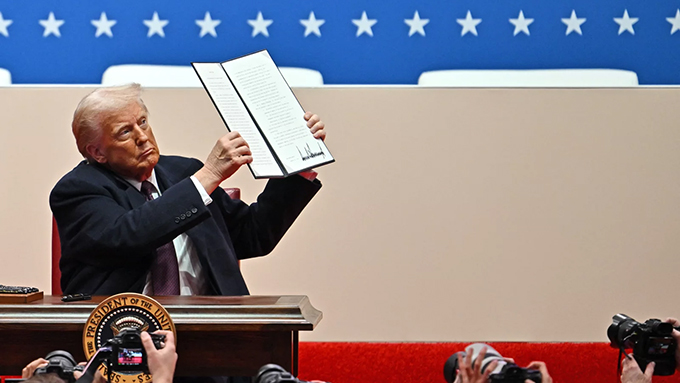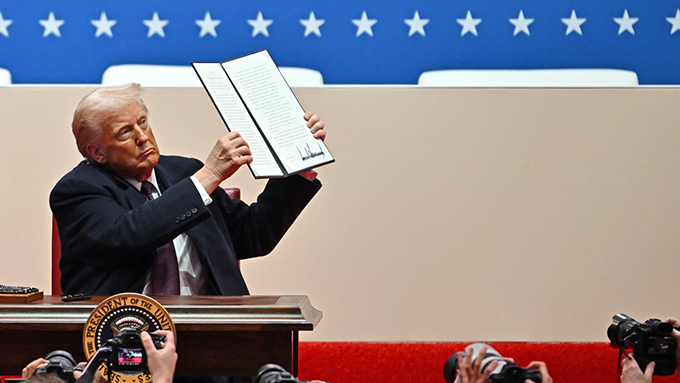
Shortly after taking office, US President Donald Trump
issued executive orders banning federal funding on so-called “woke” research.
This is part of his
broader ban on all diversity, equity and inclusion (DEI) policies, grants and programs in the US government.
These orders are massive in scope,
impacting studies as varied as stroke recovery, computing and ancient languages.
The impact in the United States so far has been dramatic. Some universities are already
cutting student admissions and looking at ways to
shed academic staff and researchers.
Now the ban has
impacted Australian researchers who have links to US government-funded projects. The Trump Administration is asking for information
on how their research fits in with US foreign and domestic policy.
What has happened?
The US government has
sent a 36-point questionnaire to some Australian researchers who are working on joint projects with US colleagues.
ABC Radio National
reports at least eight Australian universities are involved. Their research areas include foreign aid, medicine, vaccines and defence. The New York Times
reports a similar document has also been sent to other overseas organisations with US funding links.
The questions are wide-ranging and cover academics’ links to China as well as their projects’ focus on topics such as diversity, inclusion and gender identity, as well as climate change.
Some of the specific questions include:
Can you confirm that your organisation has not received ANY funding from PRC People’s Republic of China, Russia, Cuba or Iran?
Can you confirm that this is no DEI [diversity, equity and inclusion] project or DEI elements of the project? [sic]
Does this project take appropriate measures to protect women and to defend against gender ideology as defined in the below Executive Order?
Can you confirm this is not a climate or “environmental justice” project or include such elements?
The survey also covers issues such as secure borders with Mexico, ending government waste, terrorism, the war on opioids, and “eradicating anti-Christian bias”.
 Read
Read
Concern and anger
In response, the
Group of Eight (which represents Australia’s top research universities) and
Australian Academy of Science have separately raised concerns with the Australian government about the survey and its impact on Australian research.
The Group of Eight says the US has already suspended or terminated research grants with six of its eight member universities.
The National Tertiary Education Union also
labelled the survey “blatant foreign interference”.
A spokesperson for Education Minister Jason Clare says Australia is “engaging with the US government to understand what these measures mean for future funding and collaboration”.
Are Trump’s orders legal?
Trump’s executive orders are currently the subject of
numerous lawsuits in the US. Plaintiffs say Trump’s orders
violate the First and Fifth Amendments – those dealing with protection of free speech, equal protection and “due process of law” when depriving a citizen of property.
Whether Trump’s orders are legal or not is a tricky question, and will likely come down the judges
hearing each case.
In the meantime, US government agencies are
withholding funding anyway. Reports also suggests Trump has
instructed his administration to ignore court orders – hardly surprising, given Trump’s
history of contempt of US courts.
What does this mean for Australia?
US involvement in Australian research is significant. According to the
Academy of Science, US government research funding involving Australian research organisations was $A386 million in 2024.
It is
arguable Trump’s orders infringe Australian sovereignty. But the US has always had the capacity to interfere in Australian university research – it just hasn’t actually done it until now.
Research contracts signed between universities and funding bodies can contain all kinds of requirements, so US law can end up applying to Australian researchers. When the AUKUS deal was announced in 2021,
a huge question was how universities would comply with notoriously harsh US export control laws.
The survey indicates it was issued by the
US Office of Management and Budget and appears to be supported by the US
CHIPS and Science Act (which authorises certain research investments) and National Science Foundation
policies. So, while Australian researchers could potentially ignore these questionnaires, that would legally give a US funding body grounds to cancel the funding contract.
Our foreign interference laws also
weren’t designed for situations like this. Even if they did, Trump is the current head of the US government, and is likely to be
immune from prosecution
Statutory tests for foreign interference – including criteria that such acts are covert, and/or involve threats of harm –
simply don’t apply to a US president like Trump.
So legally, it doesn’t look like there is much Australia can do about Trump’s orders.
What can Australia do?
Some newly unemployed researchers are now
poised to leave the US, taking their research with them. This poses a potential security risk, with countries such as
China and
Russia both keen to capitalise on Trump’s decisions.
But other nations are also aware of the possibilities. The European Union has already
offered displaced US scientists a more “sympathetic place to work”.
South Korea and
Canada are also marketing themselves as attractive options. Australia could follow suit.
The federal government is currently
doing a strategic review of Australia’s research and development system. This could make diversifying our research partners a national priority.
This could include
revisiting a 2023 decision, not to join Horizon Europe – the European Union’s
key research fund.
Either way, given such radical changes in the US, Australia needs to seriously reconsider how it is funding and structuring research.
Author Bio: Brendan Walker-Munro is Senior Lecturer (Law) at Southern Cross University
 Shortly after taking office, US President Donald Trump issued executive orders banning federal funding on so-called “woke” research.
This is part of his broader ban on all diversity, equity and inclusion (DEI) policies, grants and programs in the US government.
These orders are massive in scope, impacting studies as varied as stroke recovery, computing and ancient languages.
The impact in the United States so far has been dramatic. Some universities are already cutting student admissions and looking at ways to shed academic staff and researchers.
Now the ban has impacted Australian researchers who have links to US government-funded projects. The Trump Administration is asking for information on how their research fits in with US foreign and domestic policy.
Shortly after taking office, US President Donald Trump issued executive orders banning federal funding on so-called “woke” research.
This is part of his broader ban on all diversity, equity and inclusion (DEI) policies, grants and programs in the US government.
These orders are massive in scope, impacting studies as varied as stroke recovery, computing and ancient languages.
The impact in the United States so far has been dramatic. Some universities are already cutting student admissions and looking at ways to shed academic staff and researchers.
Now the ban has impacted Australian researchers who have links to US government-funded projects. The Trump Administration is asking for information on how their research fits in with US foreign and domestic policy.
 Read
Read
